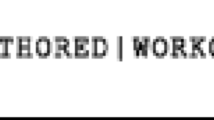Abstract
Finding relationships between authors and thematic similar publications is getting harder and harder due to the mass of information and the rapid growth of the number of scientific workers. The io-port.net portal and the DBLP Computer Science Bibliography including more than 2,000,000 and 750,000 publications, respectively, from more than 450,000 authors are major services used by thousands of computer scientists which provides fundamental support for scientists searching for publications or other scientists in similar communities.
In this paper, we describe a user–friendly interface which plays the central role in searching authors and publications and analysing social networks on the basis of bibliographical data.
After introducing the concept of multi-mode social networks, the DBL–Browser itself and various methods for multi-layered browsing through social networks are described.
Preview
Unable to display preview. Download preview PDF.
Similar content being viewed by others
References
Baeza-Yates, R., Ribeiro-Neto, B.: Modern Information Retrieval. Addison-Wesley Publishing Company, Reading (1999), http://citeseer.nj.nec.com/433337.html
Belkin, N.J., Croft, W.B.: Retrieval techniques. Annual Review of Information Science and Technology 22, 109–145 (1987)
Bhattacharya, I., Getoor, L.: Iterative record linkage for cleaning and integration. In: Proceedings of the 9th ACM SIGMOD Workshop on Research Issues in Data Mining and Knowledge Discovery, DMKD 2004, Paris, France, June 13, 2004, pp. 11–18. ACM, New York (2004)
Ding, Y., Chowdhury, G.G., Foo, S., Qian, W.: Bibliometric information retrieval system (BIRS): A web search interface utilizing bibliometric research results. Journal of the American Society for Information Science 51(13), 1190–1204 (2000)
Fankhauser, P., et al.: Fachinformationssystem Informatik (FIS-I) und Semantische Technologien für Informationsportale (SemIPort). In: Cremers, A.B., et al. (eds.) GI Jahrestagung (2). GI, LNI, vol. 68, pp. 698–712 (2005)
Han, H., et al.: Two supervised learning approaches for name disambiguation in author citations. In: Chen, H., et al. (eds.) ACM/IEEE Joint Conference on Digital Libraries, JCDL 2004, Tuscon, AZ, USA, pp. 296–305. ACM, New York (2004)
Han, H., Giles, C.L., Zha, H.: A model-based k-means algorithm for name disambiguation. In: Proceedings of the Second International Semantic Web Conference (ISWC 2003) Workshop on Semantic Web Technologies for Searching and Retrieving Scientific Data (2003)
Han, H., Zha, H., Giles, C.L.: Name disambiguation in author citations using a k-way spectral clustering method. In: Marlino, M., Sumner, T., III, F.M.S. (eds.) Proceedings of the ACM/IEEE Joint Conference on Digital Libraries, JCDL 2005, pp. 334–343. ACM, New York (2005)
Informatics online (2006), http://www.io-port.net/
Klink, S.: Improving Document Transformation Techniques with Collaborative Learned Term-Based Concepts. In: Dengel, A.R., Junker, M., Weisbecker, A. (eds.) Reading and Learning. LNCS, vol. 2956, pp. 281–305. Springer, Heidelberg (2004)
Klink, S., Ley, M., Rabbidge, E., Reuther, P., Walter, B., Weber, A.: Visualising and mining digital bibliographic data. In: Dadam, P., Reichert, M. (eds.) INFORMATIK 2004 - Informatik verbindet, Band 2, Beiträge der 34. Jahrestagung der Gesellschaft für Informatik e.V (GI). GI, LNI, vol. 51, pp. 193–197 (2004)
Lee, M.-L., Hsu, W., Kothari, V.: Cleaning the spurious links in data 19(2), 28–33 (2004)
Levenshtein, V.I.: Binary codes capable of correcting spurious insertions and deletions of ones (original in Russian). Russian Problemy Peredachi Informatsii 1, 12–25 (1965)
Ley, M.: The DBLP Computer Science Bibliography: Evolution, Research Issues, Perspectives. In: Laender, A.H.F., Oliveira, A.L. (eds.) SPIRE 2002. LNCS, vol. 2476, pp. 1–10. Springer, Heidelberg (2002)
Open business club (2006), http://www.openBC.com/
Friend of a Friend project (2006), http://www.foaf-project.org/
Wasserman, S., Faust, K.: Social Network Analysis: Methods and Applications, Structural Analysis in the Social Sciences, vol. 8. Cambridge University Press, New York (1994)
Watts, D.J.: Six Degrees: The Science of a Connected Age. W. W. Norton & Company, New York (2004)
Author information
Authors and Affiliations
Editor information
Editors and Affiliations
Rights and permissions
Copyright information
© 2006 Springer-Verlag Berlin Heidelberg
About this paper
Cite this paper
Klink, S., Reuther, P., Weber, A., Walter, B., Ley, M. (2006). Analysing Social Networks Within Bibliographical Data. In: Bressan, S., Küng, J., Wagner, R. (eds) Database and Expert Systems Applications. DEXA 2006. Lecture Notes in Computer Science, vol 4080. Springer, Berlin, Heidelberg. https://doi.org/10.1007/11827405_23
Download citation
DOI: https://doi.org/10.1007/11827405_23
Publisher Name: Springer, Berlin, Heidelberg
Print ISBN: 978-3-540-37871-6
Online ISBN: 978-3-540-37872-3
eBook Packages: Computer ScienceComputer Science (R0)




